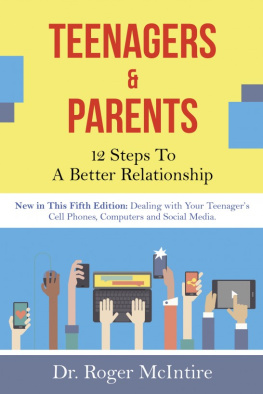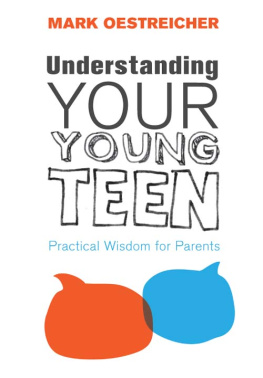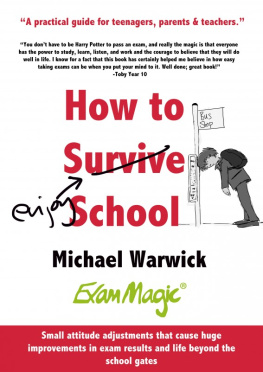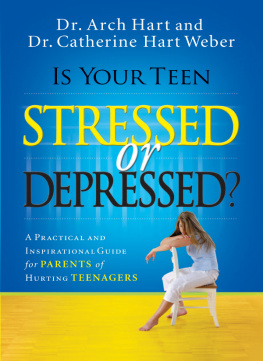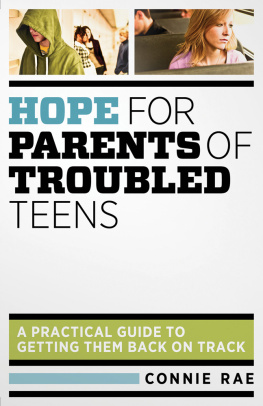Teenagers and Parents:
12 Steps to a Better Relationship
by
Dr. Roger McIntire
Published by Roger McIntireat Smashwords
Copyright 2016 RogerMcIntire
Smashwords Edition, LicenseNotes
This ebook is licensed foryour personal enjoyment only. This ebook may not be resold or givenaway to other people. If you would like to share this book withanother person, please purchase an additional copy for eachrecipient. If youre reading this book and did not purchase it, orit was not purchased for your use only, then please return toSmashwords.com and purchase your own copy. Thank you for respectingthe hard work of this author.
All rights reserved. No partof the material protected by this copyright notice may bereproduced or utilized in any form or by any means, electronic ormechanical, including photocopying, recording, or by informationstorage and retrieval system without written permission from thepublisher at sumcross@aol.com. Printed in the United States ofAmerica.
The author may be contactedat sumcross@aol.com
Cover design by EarthlyCharms, earthlycharms.com.
Table of Contents
: Listen well
4..
: Yes, You Should Look at Your TeensE-mail
: If the Computer is On, Avoid ShortcutParenting.
: Games Both Teens and Parents Play.
3..
: Careful With Punishment. It has GreatDisadvantages.
3. ?
5..
Help with the Boy Problem and SchoolWork.
3..
: Talking About Loving, Liking andSex.
9..
: Encourage Their Contributions to YourFamily.
8..
9..
12..
Treat Compulsions and Fidgeting withTolerance.
4..
7..
: The Bad Habits of Alcohol, Drugs, andCars.
6..
7..
Encourage Your Almost-Adult.
Protect Yourself During the ParentingJob.
5..
6..
Eight to twelve-year-olds are often calledTweens, so, I suppose, the teenager stage begins at about tenin the U.S. It blossoms early and develops rapidly probably becauseof so much adult experiencemostly second-handfrom TV, CDs, mobiledevices, social media, Facebook, Twitter, YouTube, talk shows andmovies.
Games are the electronic activity of choicewith the preschoolers and grade schoolers, but the first additionto the games is likely to be some form of social media with anexpanding group of internet friends. The average teenager in theU.S. spends over eight hours each day with computer companions,human or not, who pass along information, or misinformation, aboutlife, sex, social skills, and almost everything else.
Before the next ten years rush past and ourteenagers choose their next adventure with college, job or life, weparents want to build a relationship that lasts. But this internetobsession gets in the way. We want to tone down their attention totheir little electronic windows and talk with us a bit more.
Chances for conversation (coming up in thefirst step) appear and disappear from one situation to the next.Your listening skills are crucial to building your moments ofconversation with your teen and passing along these habits to yourkids. What memories and examples of your style of parenting willyour teenager remember and pass along to your grandchildren?
Robert Epstein ranked the 10 most effectivechild-rearing practices in Scientific American in 2010. He reviewedthe scientific literature and interviewed many experts and over2000 parents and their children. Top of the list was love (physicalaffection and quality one-on-one time together). Surprisingly,second was stress management by parents, of themselves. How theyhandled their own stress as it recycles through the family createdthe family atmosphere. Third was how Mom and Dad maintained theirown relationship with each other, or with their significant otheror co-parent. The top three add up to love and respect for youroff-spring, for yourself, and for your spouse or co-parent.
Of course, the top three determine aparents disposition and in turn, the daily habits ofchild-rearing. The first ten years seem to require the mostattention because the childs needs are so obvious. Five toten-year-olds require lots of help. Once they reach ten however,theyre starting to grow into teenagers and temptations multiplyand everything becomes faster, more dangerous, and harder toevaluate. Sex, drugs, and cars become part of the adolescent yearssurprisingly early. To keep up, a parent must listen a lot.
All of the theoriesabout siblings, birthorder, genetics, and early experiencescontribute understanding,but such past influences cannot be changed. Moms and Dads bestopportunity to influence their teenager, really their onlyopportunity, is confined to the here-and-nowthe present familyinteractions.
Many counselors believe that parents whohold back too much have a lasting negative influence on theirchildren. One counselor friend of mine works with corporateadministrators who suffer from depression. She said she often foundthat the root of the problem was an unfulfilled need for acceptancefrom their Dads. She added that every man longs for the day whenhis father says, Youre the son I hoped you would be.
Daughters have had the same longings, Imsure, and Moms acceptance is just as important as Dads. But Dadsmay hold back on the gushier stuff just when its needed most.Often called upon to be the heaviesWait till your father getshome!Dads may miss their opportunities to give deserved praise andadmiration.
Social media can squeeze out the time forthese important moments. Questions and solutions raised in thisbook come from both parents and their teens who were clients,regular readers of my column or website visitors. Common questionsfrom the kids were reported by parents, Can we talk? Can I quitschool? What birth control is best? I want a sister. You havemore eggs dont you? Parental questions range from, How can Ideal with her tantrums? to What about his computer addiction, herFacebook obsession and their questions about alcohol, drugs andsex?
The struggle to grow up is a confusion ofemotionsa desire to break free from parental control is mixed witha desire for parental admiration and support. Of course, teenagerswant to be on their own and different from their parents. Andconversely, parents want their children to stay close to theirexample and be more like them. The compromise develops gradually ina mixture of granting greater independence and decreasingcontrol.
On the rare occasion when your teeninterrupts his attention to his electronic window to ask, Mom (orDad), can we talk? your answer needs to be a careful one. If youand your son or daughter have this part right, all the other topicsin this book will be easier, and your adult experience will beavailable to your teen at a low price. So go slowly here andthoroughly review your conversational habits when talking with yourteenager.
The next chapter will suggest ways to weanyour teen from his computer companion, but first be sure youreready to listen. Listening skills dont come naturally to most ofus. But, with a little practice and extra attention, the skillswill help you for the rest of your parenting years.
Many people, especially teens, are mostinterested in themselves. They tune in to the parts ofconversations that are about them, and they are a little lessinterested in the rest. The most important part of the conversationwill be, What are you saying about me? Talks with our teens cango sour immediately when we parents think their mistakes are themost important parts while our teens, first of all, pay attentionto the implied personal evaluation!
Ten-year-old Kirby: Mom, Carlin is stilltexting
Mom: Carlin, no texting at the table. Itsrude.
Carlin: (15 years old) Just a minute.
Mom: No. Now I want to hear about yoursoccer game.
Carlin: (mumbling and still texting) Haveto sign off. Kid brother just squealed.

